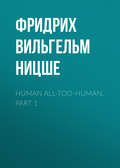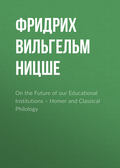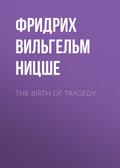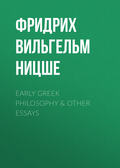
Фридрих Вильгельм Ницше
The Dawn of Day
341
The Advantage of Ignorance. – Some one has said that in his childhood he experienced such a contempt for the caprices and whims of a melancholy temperament that, until he had grown up and had become a middle-aged man, he did not know what his own temperament was like: it was precisely a melancholy temperament. He declared that this was the best of all possible kinds of ignorance.
342
Do not be deceived! – Yes, he examined the matter from every side and you think him to be a man of profound knowledge. But he only wishes to lower the price – he wants to buy it!
343
A Moral Pretence. – You refuse to be dissatisfied with yourselves or to suffer from yourselves, and this you call your moral tendency! Very well; another may perhaps call it your cowardice! One thing, however, is certain, and that is that you will never take a trip round the world (and you yourselves are this world), and you will always remain in yourselves an accident and a clod on the face of the earth! Do you fancy that we who hold different views from you are merely exposing ourselves out of pure folly to the journey through our own deserts, swamps, and glaciers, and that we are voluntarily choosing grief and disgust with ourselves, like the Stylites?
344
Subtlety in Mistakes. – If Homer, as they say, sometimes nodded, he was wiser than all the artists of sleepless ambition. We must allow admirers to stop for a time and take breath by letting them find fault now and then; for nobody can bear an uninterruptedly brilliant and untiring excellence – and instead of doing good such a master would merely become a taskmaster, whom we hate while he precedes us.
345
Our Happiness is not an Argument either Pro or Con. – Many men are only capable of a small share of happiness: and it is not an argument against their wisdom if this wisdom is unable to afford them a greater degree of happiness, any more than it is an argument against medical skill that many people are incurable, and others always ailing. May every one have the good fortune to discover the conception of existence which will enable him to realise his greatest share of happiness! though this will not necessarily prevent his life from being miserable and not worth envying.
346
The Enemies of Women. – “Woman is our enemy” – The man who speaks to men in this way exhibits an unbridled lust which not only hates itself but also its means.
347
The School of the Orator. – When a man has kept silence for a whole year he learns to stop chattering, and to discourse instead. The Pythagoreans were the best statesmen of their age.
348
The Feeling of Power. – Note the distinction: the man who wishes to acquire the feeling of power seizes upon any means, and looks upon nothing as too petty which can foster this feeling. He who already possesses power, however, has grown fastidious and refined in his tastes; few things can be found to satisfy him.
349
Not so very Important. – When we are present at a death-bed there regularly arises in us a thought that we immediately suppress from a false sense of propriety: the thought that the act of dying is less important than the customary veneration of it would wish us to believe, and that the dying man has probably lost in his life things which were more important than he is now about to lose by his death. In this case the end is certainly not the goal.
350
The best way to Promise. – When a man makes a promise it is not merely the word that promises, but what lies unexpressed behind the word. Words indeed weaken a promise by discharging and using up a power which forms part of that power which promises. Therefore shake hands when making a promise, but put your finger on your lips – in this way you will make the safest promises.
351
Generally Misunderstood. – In conversation we sometimes observe people endeavouring to set a trap in which to catch others – not out of evil-mindedness, as one might suppose, but from delight in their own shrewdness. Others again prepare a joke so that some one else may utter it, they tie the knot so that others may undo it: not out of goodwill, as might be supposed, but from wickedness, and their contempt for coarse intellects.
352
Centre. – The feeling, “I am the centre of the world,” forcibly comes to us when we are unexpectedly overtaken by disgrace: we then feel as if we were standing dazed in the midst of a surge, and dazzled by the glance of one enormous eye which gazes down upon us from all sides and looks us through and through.
353
Freedom of Speech. – “The truth must be told, even if the world should be shivered in fragments” – so cries the eminent and grandiloquent Fichte. – Yes, certainly; but we must have it first. – What he really means, however, is that each man should speak his mind, even if everything were to be turned upside down. This point, however, is open to dispute.
354
The Courage for Suffering. – Such as we now are, we are capable of bearing a tolerable amount of displeasure, and our stomach is suited to such indigestible food. If we were deprived of it, indeed, we should perhaps think the banquet of life insipid; and if it were not for our willingness to suffer pain we should have to let too many pleasures escape us!
355
Admirers. – The man who admires up to the point that he would be ready to crucify any one who did not admire, must be reckoned among the executioners of his party – beware of shaking hands with him, even when he belongs to your own side.
356
The Effect of Happiness. – The first effect of happiness is the feeling of power, and this feeling longs to manifest itself, whether towards ourselves or other men, or towards ideas and imaginary beings. Its most common modes of manifestation are making presents, derision, and destruction – all three being due to a common fundamental instinct.
357
Moral Mosquitoes. – Those moralists who are lacking in the love of knowledge, and who are only acquainted with the pleasure of giving pain, have the spirit and tediousness of provincials. Their pastime, as cruel as it is lamentable, is to observe their neighbour with the greatest possible closeness, and, unperceived, to place a pin in such position that he cannot help pricking himself with it. Such men have preserved something of the wickedness of schoolboys, who cannot amuse themselves without hunting and torturing either the living or the dead.
358
Reasons and their Unreason. – You feel a dislike for him, and adduce innumerable reasons for this dislike, but I only believe in your dislike and not in your reasons! You flatter yourself by adducing as a rational conclusion, both to yourself and to me, that which happens to be merely a matter of instinct.
359
Approving of Something. – We approve of marriage in the first place because we are not yet acquainted with it, in the second place because we have accustomed ourselves to it, and in the third place because we have contracted it – that is to say, in most cases. And yet nothing has been proved thereby in favour of the value of marriage in general.
360
No Utilitarians. – “Power which has greatly suffered both in deed and in thought is better than powerlessness which only meets with kind treatment” – such was the Greek way of thinking. In other words, the feeling of power was prized more highly by them than any mere utility or fair renown.
361
Ugly in Appearance. – Moderation appears to itself to be quite beautiful: it is unaware of the fact that in the eyes of the immoderate it seems coarse and insipid, and consequently ugly.
362
Different in Their Hatred. – There are men who do not begin to hate until they feel weak and tired: in other respects they are fair-minded and superior. Others only begin to hate when they see an opportunity for revenge: in other respects they carefully avoid both secret and open wrath, and overlook it whenever there is any occasion for it.
363
Men of Chance. – It is pure hazard which plays the essential part in every invention, but most men do not meet with this hazard.
364
Choice of Environment. – We should beware of living in an environment where we are neither able to maintain a dignified silence nor to express our loftier thoughts, so that only our complaints and needs and the whole story of our misery are left to be told. We thus become dissatisfied with ourselves and with our surroundings, and to the discomfort which brings about our complaints we add the vexation which we feel at always being in the position of grumblers. But we should, on the contrary, live in a place where we should be ashamed to speak of ourselves and where it would not be necessary to do so. – Who, however, thinks of such things, or of the choice in such things? We talk about our “fate,” brace up our shoulders, and sigh, “Unfortunate Atlas that I am!”
365
Vanity. – Vanity is the dread of appearing to be original. Hence it is a lack of pride, but not necessarily a lack of originality.
366
The Criminal's Grief. – The criminal who has been found out does not suffer because of the crime he has committed, but because of the shame and annoyance caused him either by some blunder which he has made or by being deprived of his habitual element; and keen discernment is necessary to distinguish such cases. Every one who has had much experience of prisons and reformatories is astonished at the rare instances of really genuine “remorse,” and still more so at the longing shown to return to the old wicked and beloved crime.
367
Always appearing Happy. – When, in the Greece of the third century, philosophy had become a matter of public emulation, there were not a few philosophers who became happy through the thought that others who lived according to different principles, and suffered from them, could not but feel envious of their happiness. They thought they could refute these other people with their happiness better than anything else, and to achieve this object they were content to appear to be always happy; but, following this practice, they were obliged to become happy in the long run! This, for example, was the case of the cynics.
368
The Cause of much Misunderstanding. – The morality of increasing nervous force is joyful and restless; the morality of diminishing nervous force, towards evening, or in invalids and old people, is passive, calm, patient, and melancholy, and not rarely even gloomy. In accordance with what we may possess of one or other of these moralities, we do not understand that which we lack, and we often interpret it in others as immorality and weakness.
369
Raising one's self above one's own Lowness. – “Proud” fellows they are indeed, those who, in order to establish a sense of their own dignity and importance, stand in need of other people whom they may tyrannise and oppress – those whose powerlessness and cowardice permits some one to make sublime and furious gestures in their presence with impunity, so that they require the baseness of their surroundings to raise themselves for one short moment above their own baseness! – For this purpose one man requires a dog, another a friend, a third a wife, a fourth a party, a fifth, again, one very rarely to be met with, a whole age.
370
To what extent the Thinker loves his Enemy. – Make it a rule never to withhold or conceal from yourself anything that may be thought against your own thoughts. Vow it! This is the essential requirement of honest thinking. You must undertake such a campaign against yourself every day. A victory and a conquered position are no longer your concern, but that of truth – and your defeat also is no longer your concern!
371
The Evil of Strength. – Violence as the outcome of passion, for example, of rage, must be understood from the physiological point of view as an attempt to avoid an imminent fit of suffocation. Innumerable acts arising from animal spirits and vented upon others are simply outlets for getting rid of sudden congestion by a violent muscular exertion: and perhaps the entire “evil of strength” must be considered from this point of view. (This evil of strength wounds others unintentionally – it must find an outlet somewhere; while the evil of weakness wishes to wound and to see signs of suffering.)
372
To the Credit of the Connoisseur. – As soon as some one who is no connoisseur begins to pose as a judge we should remonstrate, whether it is a male or female whipper-snapper. Enthusiasm or delight in a thing or a human being is not an argument; neither is repugnance or hatred.
373
Treacherous Blame. – “He has no knowledge of men” means in the mouth of some “He does not know what baseness is”; and in the mouths of others, “He does not know the exception and knows only too well what baseness means.”
374
The Value of Sacrifice. – The more the rights of states and princes are questioned as to their right to sacrifice the individual (for example, in the administration of justice, conscription, etc.), the more will the value of self-sacrifice rise.
375
Speaking too distinctly. – There are several reasons why we articulate our words too distinctly: in the first place, from distrust of ourselves when using a new and unpractised language; secondly, when we distrust others on account of their stupidity or their slowness of comprehension. The same remark applies to intellectual matters: our communications are sometimes too distinct, too painful, because if it were otherwise those to whom we communicate our ideas would not understand us. Consequently the perfect and easy style is only permissible when addressing a perfect audience.
376
Plenty of Sleep. – What can we do to arouse ourselves when we are weary and tired of our ego? Some recommend the gambling table, others Christianity, and others again electricity. But the best remedy, my dear hypochondriac, is, and always will be, plenty of sleep in both the literal and figurative sense of the word. Thus another morning will at length dawn upon us. The knack of worldly wisdom is to find the proper time for applying this remedy in both its forms.
377
What we may conclude from fantastic Ideals. – Where our deficiencies are, there also is our enthusiasm. The enthusiastic principle “love your enemies” had to be invented by the Jews, the best haters that ever existed; and the finest glorifications of chastity have been written by those who in their youth led dissolute and licentious lives.
378
Clean Hands and clean Walls. – Do not paint the picture either of God or the devil on your walls: for in so doing you will spoil your walls as well as your surroundings.11
379
Probable and Improbable. – A woman secretly loved a man, raised him far above her, and said to herself hundreds of times in her inmost heart, “If a man like that were to love me, I should look upon it as a condescension before which I should have to humble myself in the dust.” – And the man entertained the same feelings towards the woman, and in his inmost heart he felt the very same thought. When at last both their tongues were loosened, and they had communicated their most secret thoughts to one another, a deep and meditative silence ensued. Then the woman said in a cold voice: “The thing is quite clear! We are neither of us that which we loved! If you are what you say you are, and nothing more, then I have humbled myself in vain and loved you; the demon misled me as well as you.” This very probable story never happens – and why doesn't it?
380
Tested Advice. – Of all the means of consolation there is none so efficacious for him who has need of it as the declaration that in his case no consolation can be given. This implies such a distinction that the afflicted person will at once raise his head again.
381
Knowing one's “Individuality”. – We too often forget that in the eyes of strangers who see us for the first time we are quite different beings from what we consider ourselves to be – in most cases we exhibit nothing more than one particular characteristic which catches the eye of the stranger, and determines the impression we make on him. Thus the most peaceful and fair-minded man, if only he has a big moustache, may, as it were, repose in the shade of this moustache; for ordinary eyes will merely see in him the accessory of a big moustache, that is to say, a military, irascible, and occasionally violent character, and will act accordingly.
382
Gardeners and Gardens. – Wet dreary days, loneliness, and unkind words give rise within us to conclusions like fungi; some morning we find that they have grown up in front of us we know not whence, and there they scowl at us, sullen and morose. Woe to the thinker who instead of being the gardener of his plants, is merely the soil from which they spring.
383
The Comedy of Pity. – However much we may feel for an unhappy friend of ours, we always act with a certain amount of insincerity in his presence: we refrain from telling him everything we think, and how we think it, with all the circumspection of a doctor standing by the bedside of a patient who is seriously ill.
384
Curious Saints. – There are pusillanimous people who have a bad opinion of everything that is best in their works, and who at the same time interpret and comment upon them badly: but also, by a kind of revenge, they entertain a bad opinion of the sympathy of others, and do not believe in sympathy at all; they are ashamed to appear to be carried away from themselves, and feel a defiant comfort in appearing or becoming ridiculous. – States of soul like these are to be found in melancholy artists.
385
Vain People. – We are like shop-windows, where we ourselves are constantly arranging, concealing, or setting in the foreground those supposed qualities which others attribute to us – in order to deceive ourselves.
386
Pathetic and Naïve. – It may be a very vulgar habit to let no opportunity slip of assuming a pathetic air for the sake of the enjoyment to be experienced in imagining the spectator striking his breast and feeling himself to be small and miserable. Consequently it may also be the indication of a noble mind to make fun of pathetic situations, and to behave in an undignified manner in them. The old, warlike nobility of France possessed that kind of distinction and delicacy.
387
A Reflection before Marriage. – Supposing she loved me, what a burden she would be to me in the long run! and supposing that she did not love me, what a much greater burden she would be to me in the long run! We have to choose between two different kinds of burdens; therefore let us marry.
388
Rascality with a good Conscience. – It is exceedingly annoying to be cheated in small bargains in certain countries, – in the Tyrol, for example, – because, in addition to the bad bargain, we are compelled to accept the evil countenance and coarse greediness of the man who has cheated us, together with his bad conscience and his hostile feeling against us. At Venice, on the other hand, the cheater is highly delighted at his successful fraud, and is not in the least angry with the man he has cheated – nay, he is even inclined to show him some kindness, and above all to have a hearty laugh with him if he likes. – In short, one must possess wit and a good conscience in order to be a knave, and this will almost reconcile the cheated one with the cheat.12
389
Rather too Awkward. – Good people who are too awkward to be polite and amiable promptly endeavour to return an act of politeness by an important service, or by a contribution beyond their power. It is touching to see them timidly producing their gold coins when others have offered them their gilded coppers!
390
Hiding one's Intelligence. – When we surprise some one in the act of hiding his intelligence from us we call him evil: the more so if we suspect that it is his civility and benevolence which have induced him to do so.
391
The Evil Moment. – Lively dispositions only lie for a moment: after this they have deceived themselves, and are convinced and honest.
392
The Condition of Politeness. – Politeness is a very good thing, and really one of the four chief virtues (although the last), but in order that it may not result in our becoming tiresome to one another the person with whom I have to deal must be either one degree more or less polite than I – otherwise we should never get on, and the ointment would not only anoint us, but would cement us together.






